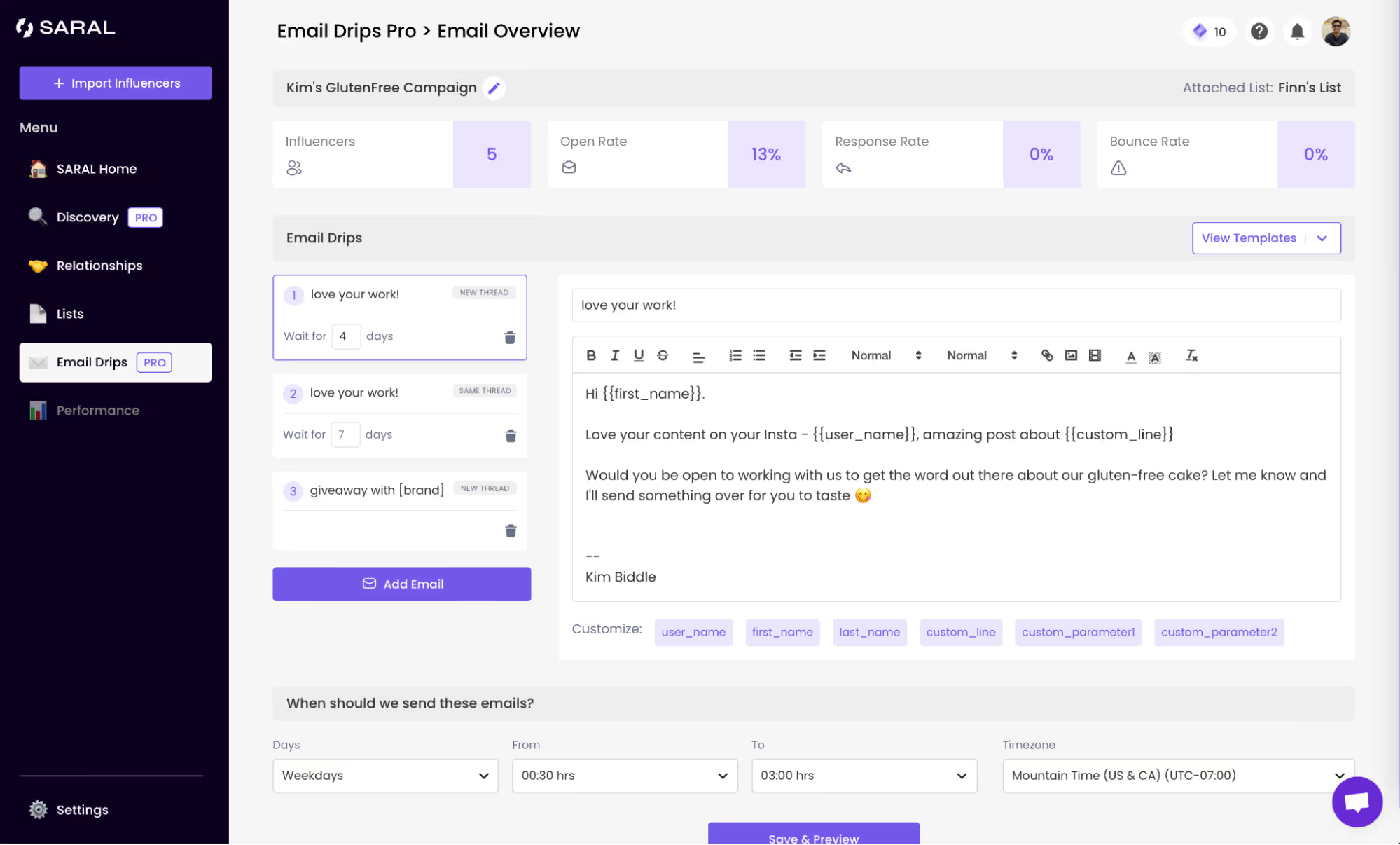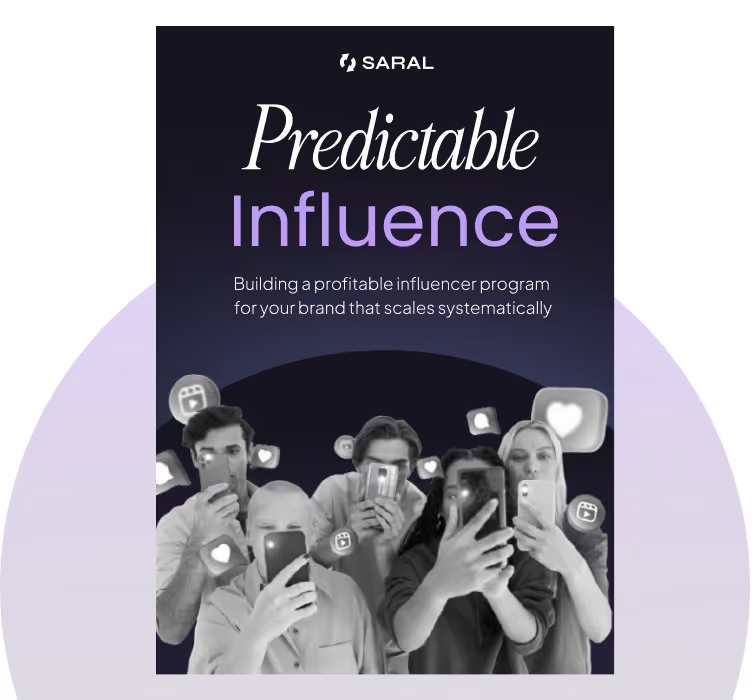Ready to drive incremental growth with influencers?
If ditching the randomness of influencer campaigns and building a predictable, ROI-first influencer program sounds like a plan. Consider talking to our team!

Influencer Marketing
Learn how to level up your DTC brand with the right influencer marketing manager to drive growth.
Contents
Did you know that Gymshark's journey from a garage-based startup to a globally recognized brand began with a simple yet effective strategy: sending brand apparel to athletes admired by the founder, Ben Francis, as a token of appreciation for their content?
In a similar vein, the founders of Pura Vida Bracelets initially took a hands-on approach to influencer marketing, personally reaching out to influencers and fostering long-term partnerships.
It may seem like I'm suggesting DTC founders should handle influencer marketing on their own, based on these success stories. But that's not all.
The point I want to make is that both these brands, despite their humble beginnings, now operate with specialized teams to manage their influencer relations, underscoring the value of professional management in scaling such efforts.
If you've also recognized the need to professionalize and scale your influencer marketing efforts, this blog is for you. This will help you find your first influencer marketing manager, ensuring they are capable of driving significant results, just like those experienced by successful DTC brands.
The role of an influencer marketing manager is about understanding the brand's narrative and finding the right voices online that can convey this story to the right target audience.
It's not just about picking influencers with the biggest followings but selecting those whose brand values, audience, and content style mesh seamlessly with what the brand stands for. This role ensures that the influencer relationships feel authentic and resonate with potential customers.
The Influencer Marketing Manager also plays an important role in aligning and integrating influencer campaigns with the brand's current priorities, whether that's driving more conversions, boosting website traffic, or increasing brand awareness. For instance, if the brand's immediate goal is to ramp up sales, they might implement partnerships based on commission models. If the aim is to expand the brand's reach they can go for strategies like gifting or product seeding.
The persona in this role acts as a bridge between the brand and the influencers. They carry the responsibility of upholding the brand's reputation, ensuring that every interaction and partnership reflects the brand's standards and contributes positively to its image. This is why it's important to assess their skills and knowledge as well as use their predictive index results using top HR software to hire the perfect candidate.
This is why it's important to assess their skills and knowledge as well as use the predictive index behavioural assessment or behavioural management test to hire the perfect candidate.
If your brand is at a point where you're looking to scale your marketing efforts and diversify your channels, it might be the right time to hire an influencer marketing manager. They can focus on influencer marketing channel.
You may even be considering expanding your business to new international markets, in which case hiring an influencer marketing manager with local market expertise (using a global hiring platform such as Deel or Remote, for example) may be wise.
If managing influencer relationships is becoming too complex or time-consuming for your current team, it's a sign to bring in a specialist.
They can re-engage with dormant influencers (the ones who're not posting consistently about your brand) with new initiatives, negotiate terms that keep both parties actively involved, or decide to end partnerships that no longer serve your brand's interests.
If you're aware that influencer marketing is beneficial for your brand but are uncertain about the specific strategies that need improvement, hiring an influencer marketing manager can be crucial. They can conduct an in-depth analysis of your current influencer marketing efforts, and identify areas for optimization, whether it's onboarding different influencers, exploring new social platforms, or adjusting the types of content being produced.
If your brand's influencer content isn't being used to its full potential— it's not shared regularly on your social media, it's not a part of your website's social proof section, etc., it's time to think about hiring an influencer marketing manager.
This expert can help you get the most out of every post, video, or story influencers create for you. They'll find smart ways to reuse this content across different platforms, from Instagram to your email newsletters, making sure it's seen by more people and brings more value to your brand.
When looking for an influencer marketing manager for your brand, it's important to find someone who has a blend of strategic vision and tactical expertise. This role requires a balance between big-picture thinking and the practical execution of day-to-day tasks.
Here are some key qualities and skills to look for:
Before you sit down with potential candidates, it's good to prepare a list of questions that are closely aligned with your brand's goals, the challenges you're facing, and the specific outcomes you want from your influencer marketing efforts.
Leave the tired, eye-roll-inducing classics like "Where do you see yourself in 5 years?" to the history books of hiring. You're not looking for a traveler.
Let's look at questions that will genuinely assess their ability to handle the influencer marketing for your DTC brand. With each question, you can also see what it will be assessing:
This question evaluates the candidate's practical skills and familiarity with industry-standard tools. It reveals their efficiency in campaign management, analytics, and influencer discovery, providing insight into their operational competence.
This assesses the candidate's industry awareness and critical thinking by exploring their understanding of successful influencer marketing strategies. It also reveals their ability to analyze and apply best practices from other brands to their work.
This question assesses the candidate's research skills, strategic alignment with your brand values, and their ability to tailor strategies to specific brand needs. It also gauges their understanding of your target market and product offering.
Reveals the candidate's conflict resolution and decision-making skills. It also provides insights into their standards for influencer performance and brand alignment.
Assesses the candidate's ability to strategize influencer selection based on campaign goals, budget, and audience engagement. It also reveals their understanding of the nuances and benefits of working with different types of influencers.
This question evaluates the candidate's understanding of nuanced metrics and KPIs in influencer marketing. It shows their ability to look at the bigger picture of brand alignment, audience quality, and conversion impact, assessing their analytical depth.
This question tests the candidate's resourcefulness and efficiency in budget management. It highlights their creative problem-solving skills and their ability to deliver impactful results without substantial financial resources.
Evaluates the candidate's approach to building lasting partnerships and the importance they place on influencer retention.
This question checks the candidate's ability to maintain brand consistency and ensures that the influencer's content resonates with the brand's identity.
Evaluates the candidate's communication skills, professionalism, and their ability to guide influencers toward producing content that meets brand standards.
This question examines the candidate's strategies for identifying influencers who align with the brand's values and ensures authentic partnerships.
Checks the candidate's ability to maintain a healthy balance between creative freedom and brand guidelines, promoting authenticity while safeguarding brand identity.
Evaluates the candidate's creativity in keeping influencers motivated and invested in long-term partnerships.
This evaluates their ability to negotiate and strike win-win deals with influencers. They should ideally answer with a good negotiation tactic, send free product anyway, and try to establish a relationship first, before discussing payment with influencers.
If you don't have the right tools to run your influencer marketing campaigns, your new hire can find themselves bogged down in the nitty-gritty details of influencer campaigns, drowning in spreadsheets, and losing precious hours to manual work.
Even the most talented marketing minds can fail without the right tools.
One such tool you should have for all your influencer marketing needs is — SARAL, an all-in-one influencer marketing tool that's designed for DTC brands.
Here are 3 of the many qualities that set it apart:



Ready to see the difference for yourself? Try it for free for 7 days. During this trial, you can explore all the features, experience our dedicated support, and even launch your first product seeding or affiliate campaign.

Sign up for a 7-day email course on the unique "Predictable Influence" strategy used by top brands like Grüns, Obvi, Tabs Chocolate.

Jump into our email course and master the basics of building an influencer marketing program. It’s everything you need to start strong.

If ditching the randomness of influencer campaigns and building a predictable, ROI-first influencer program sounds like a plan. Consider talking to our team!